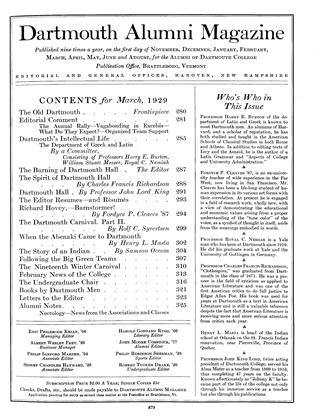AND now there is nothing left but smoking rafters, a fragment of a wall and a blackened chimney, but already the spirit of the hall has leaped into the clouds and is traveling to the four quarters of the sky. The appeal has gone ringing out in Massachusetts,
"This is not an invitation; it is a Summons!" and Dartmouth men are gathering in the nearest centers before the smoke has ceased to hover over the hill. Webster had this hall in mind when he said "It is a small college," and the memory of it is stirring the hearts of hundreds of Dartmouth men everywhere. President Tucker has assembled the classes in the large hall of the Commons and the students of the four classes on the ground vote to bend all their energies towards a rebuilding.
One can hardly understand the emotions of the Dartmouth men who were present at the burning of the hall. There was a feeling that somehow or other the world had come to an end,—or at least that one world had come to an end and that another was just beginning. Dartmouth Hall on the preceding night when a mass meeting had been held there seemed as integral a part of the College as did the very name Dartmouth. Men seldom give much conscious thought to the history that invests lands or buildings about them; it takes some great event, some cataclysm perhaps to bring home the values of such association. But on that morning Dartmouth hall seemed to tower up into the past; a curious juxtaposition of ideas that placed the past above rather than below the present. It towered into the days of the most romantic history that any institution can have, the days of pioneering, of struggles with the elements, and hunger and war and cold; it towered into the past of the days that were, before the country in which we live had come into existence, and it towered through the totals of the magnificence of the lives of its sons.
Scarcely had the fires died out of the old logs in the hall cellar when the souvenir hunters began work. Pieces of bell-metal were taken out and cast into little bells which men wore as watch charms; old nails and hinges, pounded out in the 18th century by hand were carefully collected and preserved. The two window frames were removed to a safe place to be inserted in the new building, and portions of rescued cornice were kept for models. And in less time than we ever thought it could be done, the Hanover Gazette came out with a full story of the fire, and across the top of the front page went the great black line
DARTMOUTH HALL LIES IN RUINS
THE LAST OF DARTMOUTH HALL
 View Full Issue
View Full Issue
More From This Issue
-
 Article
ArticleRichard Hovey,-Barnstormer!
March 1929 By Fordyce P. Cleaves '87 -
 Lettter from the Editor
Lettter from the EditorEditorial Comment
March 1929 -
 Article
ArticleThe Dartmouth Carnival
March 1929 By Rolf C. Syvertsen -
 Class Notes
Class NotesCLASS OF 1927
March 1929 By Doane Arnold -
 Class Notes
Class NotesCLASS OF 1914
March 1929 By John R. Burleigh -
 Article
ArticleThe Story of an Indian
March 1929 By Samson Occom
Article
-
 Article
ArticleMore green in the hall of fame
APRIL • 1987 -
 Article
ArticleSound Bodies
SEPTEMBER 1990 -
 Article
ArticleThe Hanover Scene
October 1955 By BILL McCARTER '19 -
 Article
ArticleSan Francisco
FEBRUARY 1970 By CARLTON J. WARD '32 -
 Article
ArticleDelaware
NOVEMBER 1969 By KENNETH W, LUNDSTROM '55 -
 Article
ArticleThe Undergraduate Chair
May 1949 By Robert L. Allcott '50.

